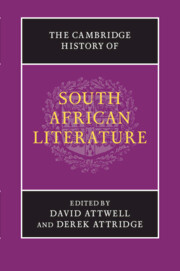Book contents
- Frontmatter
- Introduction
- PART I ORATURES, ORAL HISTORIES, ORIGINS
- PART II EXPLORATION, EARLY MODERNITY AND ENLIGHTENMENT AT THE CAPE, 1488–1820
- PART III EMPIRE, RESISTANCE AND NATIONAL BEGINNINGS, 1820–1910
- PART IV MODERNISM AND TRANSNATIONAL CULTURE, 1910–1948
- 14 Black writers and the historical novel: 1907–1948
- 15 The Dertigers and the plaasroman: two brief perspectives on Afrikaans literature
- 16 New African modernity and the New African movement
- 17 Refracted modernisms: Roy Campbell, Herbert Dhlomo, N. P. van Wyk Louw
- 18 The metropolitan and the local: Douglas Blackburn, Pauline Smith, William Plomer, Herman Charles Bosman
- PART V APARTHEID AND ITS AFTERMATH, 1948 TO THE PRESENT
- PART VI SOUTH AFRICAN LITERATURE: CONTINUITIES AND CONTRASTS
- Index
- References
16 - New African modernity and the New African movement
from PART IV - MODERNISM AND TRANSNATIONAL CULTURE, 1910–1948
Published online by Cambridge University Press: 28 January 2012
- Frontmatter
- Introduction
- PART I ORATURES, ORAL HISTORIES, ORIGINS
- PART II EXPLORATION, EARLY MODERNITY AND ENLIGHTENMENT AT THE CAPE, 1488–1820
- PART III EMPIRE, RESISTANCE AND NATIONAL BEGINNINGS, 1820–1910
- PART IV MODERNISM AND TRANSNATIONAL CULTURE, 1910–1948
- 14 Black writers and the historical novel: 1907–1948
- 15 The Dertigers and the plaasroman: two brief perspectives on Afrikaans literature
- 16 New African modernity and the New African movement
- 17 Refracted modernisms: Roy Campbell, Herbert Dhlomo, N. P. van Wyk Louw
- 18 The metropolitan and the local: Douglas Blackburn, Pauline Smith, William Plomer, Herman Charles Bosman
- PART V APARTHEID AND ITS AFTERMATH, 1948 TO THE PRESENT
- PART VI SOUTH AFRICAN LITERATURE: CONTINUITIES AND CONTRASTS
- Index
- References
Summary
In the early years of the twentieth century African people were confronted with the hegemony of European modernity, which had violently entered African history through the social formation of capitalism and the political systems of imperialism and colonialism. They came to the gradual realisation that colonial modernity, which was a variation of European modernity, had to be engaged with, even if principally in opposition, since modernity as a worldly experience was a ‘historical necessity’, as Jameson was to argue in several of his writings in the closing years of the twentieth century where he retroactively traced the historical passageways frommodernity to postmodernity (Postmodernism and A Singular Modernity).
Since Europeanmodernity in the form of imperialism had jettisoned African people from African history into European history, the historical challenge for them became how to revert back to African history, as Amilcar Cabral astutely observed in the revolutionary decade of the 1960s (Return to the Source). In this era of social upheaval, Cabral postulated the national liberation struggle as an effective instrument for reversion back to African history. In contrast to the moment of Cabral, in the early decades of that century, when imperialism and colonialism were hegemonic and consequently had the monopoly of power regarding state violence, many New African intellectuals sought to master the complexity of European modernity with the intent of subverting it to a form of modernity that would emerge from the democratic imperatives of African history.
- Type
- Chapter
- Information
- The Cambridge History of South African Literature , pp. 325 - 338Publisher: Cambridge University PressPrint publication year: 2012
References
- 7
- Cited by



